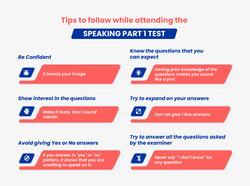Jul 11, 2022
10 tips : IELTS Speaking test




Tip 1: Don't memorise answers
Tip 2: Don't use big and unfamiliar words
Tip 3: Use a range of grammatical structures
Tip 4: Don't worry about your accent
Tip 5: Pause to think
Tip 6: Avoid using fillers
Tip 7: Extend your answers
Tip 8: Smiling helps pronunciation
Tip 9: Don't speak in a monotone
Tip 9: Don't speak in a monotone
Tip 10 - Practice common IELTS topics
Tip 1: Don't memorise answers
Don't memorise answers, especially in Part 1. Memorised language doesn't give the examiner an accurate measure of your English-language skills. The examiner will be able to tell if you have memorised your answers and this may influence your final band score.
Tip 2: Don't use big and unfamiliar words
You may want to impress the examiner with big and complex words in your Speaking test. But to be safe, avoid using words you are not familiar with. There is a higher chance of making mistakes by either mispronouncing words or using them in the wrong context. Mistakes can affect your final band score.
Tip 3: Use a range of grammatical structures
When IELTS examiners assess your speaking skills, they mark you against the following assessment criteria:
Fluency and coherence
Lexical resource
Grammatical range and accuracy
Pronunciation
Try and use a range of grammatical structures using complex and simple sentences to express what you want to say. Know your own errors and practice speaking to friends in English, or record yourself to see if you can spot errors. If you hear an error, make sure to correct yourself. You are assessed on your ability to use different grammatical structures accurately, so it's important to practise speaking about the past, the present and the future using correct tenses.
Tip 4: Don't worry about your accent
With a face-to-face Speaking test, the IELTS examiner understands a wide range of accents so will be able to understand what you say, unlike an AI machine. If you can communicate well, then there is nothing to worry about. But do be aware of sounds that you have difficulty with and make sure to use stress and intonation as English is a stress-timed language. Practice with friends and they will tell you if they can't understand what you are saying.
Tip 5: Pause to think
There is no harm in taking a brief pause to think about what to say. We all do it to process questions. You can use phrases to give you time to think during the Speaking test - phrases such as:
That's an interesting question
I have never thought about that, but...
Let me see
That's a good point
That's a difficult question, but I'll try and answer it
Well, some people say that is the case, however I think...
Let me think about that for a minute
Tip 6: Avoid using fillers
Speak confidently and avoid using filler words. We generally use fillers when we don't know what to say, however, this shows the examiner that you can't access the appropriate language or ideas so it's important to avoid them and to use the phrases we gave you in Tip 5.
Avoid the following fillers:
Like
You know
Umm...
Ahh...
Ehh...
Well
Yeah...
Tip 7: Extend your answers
Try and answer the examiner's questions in full. Extend your answers and don't wait for the examiner to prompt you with a question. When your answers are short, this shows the examiner that you cannot talk in detail about a topic. If the examiner says 'Why?', they are prompting you to give a reason for your answer and to extend more fully.
Tip 8: Smiling helps pronunciation
Smiling can help calm your nerves which in turn helps your pronunciation. Make sure to enunciate clearly, opening your mouth wide enough so that sounds come out clearly. When we smile, our mouth is bigger and the tone of our voice is more friendly. Using clear enunciation and tone will show the examiner that you can use a range of pronunciation features.
Tip 9: Don't speak in a monotone
Sometimes when we speak, we produce a flat sound, a monotone, with little variation. This makes it more difficult to express what you say and makes it more difficult for the listener to identify what parts of your message are important. Putting emphasis on certain words and pausing at sections in your speech can make your conversation with the IELTS examiner more engaging. When we emphasise certain words it makes it easier to compare and contrast ideas by stressing key words. It also increases the flow of conversation, so remember:
Don't speak in a monotone
Vary the stress and intonation to add emphasis
Use your hands to gesture and help the rhythm of the conversation
Tip 10 - Practice common IELTS topics
Common topics you can practice for the Speaking test include:
Tourism and travel
Education
Transport
Environment
Family life
Sport and recreation
Crime and punishment
The internet
Advertising and retail
TOPIC : TOURISM AND TRAVEL
EXAMINER - Describe the advantages and disadvantages of tourism in the modern world. Do you think that benefits of tourism outweight its drawbacks?
TOPIC : EDUCATION
EXAMINER - Describe a period of time from your studies that was the most difficult for you so far. You should say:
When it was
Why was it hard
What you were doing at that time
TOPIC : ENVIRONMENT
EXAMINER - Describe an environmental problem or event. You should say:
What is it?
Where is it happening?
What problems does it cause?
TOPIC : TRANSPORT
EXAMNIER - What form of transport do you prefer to use? Why?
TOPIC : FAMILY LIFE
EXAMINER - Tell me something about your family. In what way is your family important to you?
TOPIC : SPORT AND RECREATION
EXAMINER - What kind of sport do you prefer?
Tell me about your hobbies. Is there anything you like to do in your leisure time?
TOPIC : CRIME AND PUNISHMENT
EXAMINER - Some people think that offenders should be put in prison. Others, however, believe that providing offenders with education and training is more effective than putting them in prison.
Discuss both these views and give your own opinion.
TOPIC : THE INTERNET
EXAMINER -
How important is the internet to you?
How often do you use the internet?
Do you think you use the internet too much?
TOPIC : ADVERTISEMENT
EXAMINER - Are advertisements important?
Do you watch advertisements on television or on internet?
Are there many advertisements in your country?

By undefined
25 notes ・ 60 views
English
Elementary